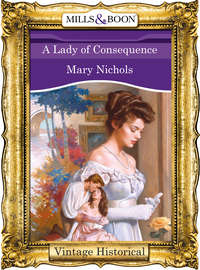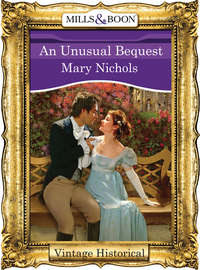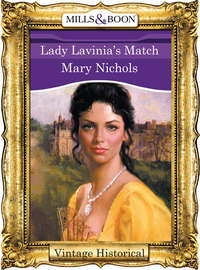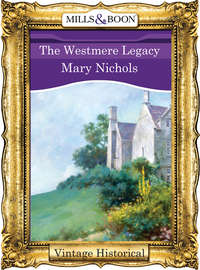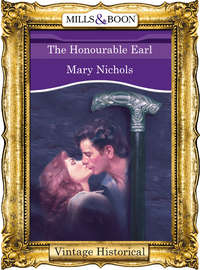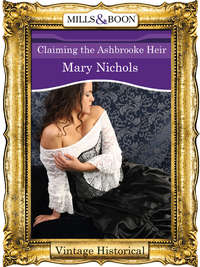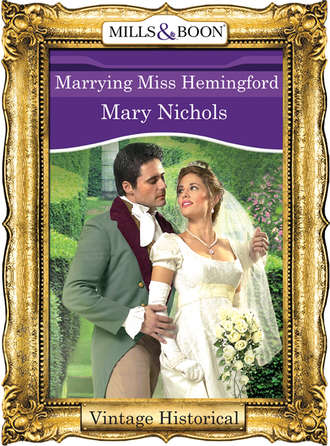
Полная версия
Marrying Miss Hemingford
‘No, Mrs Carter, I had no plans for one.’
‘The boy who brought it insisted he had come to the right address and he wouldn’t take it away again.’
‘No, I don’t suppose he would,’ Anne said, trying to stifle her amusement. ‘It is a gift to me.’
‘A gift? Whatever for?’ her aunt demanded. ‘Who do you know in Brighton to give you a gift, and such an extraordinary one as this?’
Anne, who had slipped into the house the day before and changed her bloodstained clothes before joining her aunt, had not seen fit to tell her about the previous day’s encounter. She didn’t know why she had said nothing; it was not in her nature to keep secrets, but her meeting with Dr Tremayne had been so disturbing she wanted to keep it to herself, at least until she had analysed why he had made her heart beat so fast. If she had been young and silly, she might have said she had fallen in love with him on the spot, but she was not young and silly and so it must surely have another cause.
Her aunt was looking at her, expecting an answer, and so she was obliged to explain that she had helped the child of a local fisherman and this was his way of saying thank you. ‘She was hurt in an accident with a curricle. I took her to a doctor and went in search of her mother,’ she said.
‘I can see the child would need help,’ her aunt said. ‘But were there no gentlemen about who could have done so? It is unseemly for you to be associating with common fishermen.’
‘I never met the fisherman, Aunt, only his wife. She is a hardworking woman who wanted to reward me…’
‘Surely you can do a good turn without being rewarded?’
‘Of course I can, but it would have hurt her pride to refuse. I didn’t realise she would actually send it, nor so much. I thought she would probably forget the minute I had left.’
‘So now we have a box of fish that we cannot possibly eat before it goes bad.’
‘If we knew anyone to invite, we could give a supper party,’ Anne said.
‘You are right,’ her aunt said suddenly. ‘I think it is time we began our social calls. Mrs Carter, take some of the fish for yourself and give some to the other servants and find a tasty recipe to use the rest. It gives us very little time, but a supper party it will have to be. Come, Anne, change your dress. We will call on Lady Mancroft first.’
Her ladyship had taken a house in St James’s Place, not far from the homes of the elite who occupied the houses in the vicinity of the Pavilion. She was ‘at home’, which meant her elegant drawing room was filled with friends and those newly arrived in the town, like Mrs Bartrum and Anne. She was a tall, heavily built woman, wearing a diaphanous high-waisted gown in a pea-green colour over a slip of darker green and a matching satin turban with three tall feathers fastened to it with a jewelled pin.
‘Georgiana!’ she cried when she saw Mrs Bartrum. ‘So you are back in society.’ Being so tall, she had to bend to kiss Aunt Bartrum’s cheek and then stood back to appraise her. ‘You are looking well. I declare widow’s weeds become you, which they don’t everyone, to be sure. What brings you to Brighton?’
Mrs Bartrum looked suitably doleful at the mention of her mourning, but quickly recovered. ‘I have brought my niece for a visit. She has not been here before and needed a little diversion.’ She took Anne’s hand and drew her forward. ‘May I present Miss Hemingford.’
Lady Mancroft lifted her quizzing glass to peer at Anne. ‘Granddaughter of the late Earl of Bostock, aren’t you?’
‘Yes, my lady.’
‘Not in mourning?’ There was a hint of reproof in her voice.
‘Grandfather expressly forbade it. It was his dying wish.’
‘But that doesn’t mean the poor girl is not grieving,’ Mrs Bartrum put in quickly ‘She looked after him dutifully and I believe she deserves a little respite.’
‘Then we shall have to do our best to amuse you both. Now, let me introduce you to everyone.’
She led them round the company, naming everyone and explaining who they were in relation to the aristocrats of the day—the cousin of a duke, the daughter of a marquis, a baronet, a banker with no claim to fame except his enormous wealth, Sir Somebody-or-Other, Lady This and Miss That—so that in the end Anne’s head was reeling. She supposed she would remember them all given time.
‘And here is my son, Charles,’ her ladyship said, pulling on the sleeve of a Hussar major who was in animated conversation with another gentleman. ‘Charles, come and say how d’you do to Mrs Bartrum. You remember we met her when we went up to the Lakes on a walking tour.’
He turned and bowed. He was a tall man of about seven and thirty, with a shock of blond curls and pale blue eyes. ‘Your obedient, ma’am. It was several years ago, but I do remember how gracious and hospitable you were.’
Mrs Bartrum acknowledged this flummery with a smile. ‘This is Miss Hemingford,’ she said, drawing Anne forward. ‘Bostock’s sister.’
Her aunt’s mention of her relationship to the Earl of Bostock brought home to Anne very forcefully that Harry was now the Earl and her grandfather was no more. It saddened her, but she managed a warm smile. ‘Good afternoon, Major.’
He executed a flourishing leg. It was, Anne noted, a well-shaped leg clad in the blue pantaloons of the 10th Hussars, the Prince of Wales’s own regiment. She was reminded of the curricle that had knocked over Tildy Smith; the driver of that had been wearing the same uniform, but she realised almost at once that Major Mancroft was not the man. ‘Your obedient, Miss Hemingford,’ he said. ‘May I present my good friend, Captain Gosforth?’
The man he had been conversing with gave Anne a low bow. He was dressed in a brown frockcoat and biscuit-coloured trousers, held down by a strap under his shoe. He had a rugged complexion, gingery hair and hazel eyes, full of good humour. After the usual civilities had been exchanged with Mrs Bartrum, he asked, ‘Have you taken to the water yet, ladies?’
‘No,’ Mrs Bartrum answered him. ‘But we are planning to do so.’
‘Nothing like it for effecting a cure,’ he said.
‘A cure for what?’ Anne asked.
‘Oh, almost anything. Gout, the ague, stomach disorders, consumption, flux…’
‘I do not have any of those things, Captain.’ It was said with a smile and a twinkle in the eye.
‘No, naturally not. I did not mean—’
‘I think you are being gammoned, Walter,’ the Major put in. ‘But taking a dip is not only a cure, Miss Hemingford, it is very invigorating.’
‘Then we shall certainly attempt it,’ Mrs Bartrum said. She turned to speak to Lady Mancroft. ‘I am having an informal supper party tomorrow evening, just a small affair with a hand or two of whist afterwards. It is short notice, I know, but perhaps you and Lord Mancroft might care to come? And you, Major Mancroft and Captain Gosforth.’
‘Who’s your cook?’ boomed Lord Mancroft. He was a very big man, not only in height but in breadth, and had a vast belly.
If Mrs Bartrum was taken aback by the question, she did not show it. ‘Her name is Mrs Carter, my lord. She came highly recommended and so far I cannot fault her…’
‘Mrs Carter, eh. Then you may expect us. I would give up supper with the Regent for one of her dinners. How did you manage to acquire her?’
‘Our agent hired her.’
‘We have a French chef,’ Lady Mancroft explained. ‘And he will brook no interference, otherwise we might have tried to add her to our staff…’
‘I’ll wager Mrs Carter would not have gone,’ Anne whispered to her aunt behind her fan.
Mrs Bartrum, prompted by Lady Mancroft, included Mrs Barry and her two daughters, Annabelle and Jeanette, Sir Gerald Sylvester, an acquaintance of Lord Mancroft, and Lieutenants Cawston and Harcourt, both officers of the 10th Hussars.
‘That’s settled then,’ Mrs Bartrum said, and, after bidding goodbye to the company, she and Anne took their leave.
‘We shall have to live up to Mrs Carter’s reputation now,’ Anne said as they strolled home. ‘Will the fish be enough?’
‘In quantity there is no doubt of it, but we cannot feed them on fish and nothing else. We will have to have a roast or two and a chicken dish, boiled ham and several sweets.’
‘You did say it was to be informal.’
‘So it shall be. Small, select and exquisitely cooked. I will not have Mrs Carter compared unfavourably with a French chef. And they do say the way to a man’s heart is through his stomach.’
Anne stopped in mid-stride and turned to face her aunt. ‘Which man?’
‘Oh, there are several possibles. Did you not find Major Mancroft very handsome?’
‘He was not ill looking, but…’
‘Oh, I know he is only the son of a baron, for all the superior airs Lord Mancroft assumes, but you have left it a little late to catch a true aristocrat…’
‘Too late, my dear aunt. I told you I did not want you to find me a husband.’
‘I am not. But if one should appear, we should not look a gift horse in the mouth.’
Anne laughed. ‘But Major Mancroft is not a horse.’
‘No, but you know what I mean. I am simply pointing out the possibilities. And there is Captain Gosforth. He was a naval captain, you know. Widowed…’
‘How do you know?’
‘I made it my business to find out. His wife died some years ago while he was away at sea. They had no children. He was invalided out at the beginning of the war and is now a gentleman farmer…’
‘You mean one who does not get his hands dirty or his boots muddy except on the hunting field.’
‘Of course he would not. Anne, how provoking you are. You know I would never think of inviting a yokel to supper. He is related to Lord Downland, I think, though I am not sure of the exact relationship, but he is perfectly acceptable.’
‘Maybe he has his sights elsewhere.’
‘With you in the room, no single man has any business looking elsewhere.’
Anne burst out laughing and hugged her aunt’s arm as they continued their walk. ‘Oh, Aunt Georgie, you are as good as any medicine.’ And suddenly she was remembering Dr Tremayne again. Was he single? Surely a man as dedicated and busy as he was would need a wife to help him? She had at first thought Mrs Armistead was his wife until he had addressed her by name and in a voice that one would use to a servant, so she supposed she was his housekeeper or perhaps a nurse to help with his patients, but one who also made sure he had regular meals.
One thing was certain, he was not afraid to dirty his hands, nor his clothes come to that, and he had spent five minutes in the same room with her before he had even deigned to notice her. He had a hard outer crust, but that was assumed, she was sure of it, because when he was dealing with Tildy, his whole expression had changed and his eyes had softened and become full of concern. Like her, he loved children. She smiled; it was a good thing her aunt did not know what was occupying her thoughts at that moment.
‘Why are you smiling?’
‘I was thinking of Lord Mancroft’s praise of Mrs Carter,’ she fibbed. ‘She must be famous in Brighton.’
‘Judging by the size of his lordship’s waist, I would say he was an expert in culinary appreciation, wouldn’t you?’
‘Oh, no doubt of it,’ Anne laughed, then added, ‘Shall we take a dip tomorrow? Mrs Smith, the mother of that little girl, is a bathing attendant and she said she would look out for us.’
‘You seem to have found out a lot about her in a short time, Anne.’ There was a note of censure in her voice and Anne found herself on the defensive.
‘Not at all. I know very little. The child told us her mother worked on the beach, so I went in search of her. The husband is a fisherman and there is also a boy called Tom. I imagine it was he who brought the fish to us. Tom was supposed to be looking after Tildy while his mother worked, but he went off to help his father.’ She laughed suddenly. ‘He had apparently caught a monster.’
‘A monster? What kind of monster?’
‘I have no idea. I assumed it was a larger-than-usual fish.’
‘Well, it is of no moment,’ her aunt said. ‘You did what you could to help them and that should be an end of it.’
‘I would dearly like to know who that officer was driving the curricle. How anyone can run down a child and carry on as if nothing untoward had happened I do not know. It was wicked. He might have killed her.’
‘Anne, I know you have a tender heart and I would not have you any other way, but you cannot fight everyone’s battles for them. Put it from your mind. You are here to enjoy yourself.’
Anne did try to put it from her mind, but whatever she was doing, the memory of that tiny child lying unconscious in the road kept intruding, and when she wasn’t thinking of Tildy, she was thinking of Dr Tremayne and, try as she might, she could not banish him. Perhaps if she were to see him again, she might realise that he was not an Adonis, nor clever, just a very ordinary man, not even a gentleman, a physician who worked among the poor because he was not good enough to minister to the rich and earn the substantial fees they were prepared to pay. But that did not mean she could not sympathise with his work. And she had promised a donation. Instead of sending it through a third party as she had intended, she would take it herself when she could get away from her aunt without arousing suspicion. She had a feeling that Aunt Bartrum would not approve.
The remainder of the day was spent in making plans for the supper party. Her aunt drew her into every decision, from the bill of fare and the wine, to the table decorations and the clothes they should wear. Mrs Bartrum would be dressed in unrelieved black, but the gown she chose was of silk, elegantly cut with a low décolletage and deep satin ruching round the hem and it fitted her slight form to perfection. Widow or not, she was still a very attractive woman. But Anne’s choice was another matter. ‘Let me see what you have brought with you,’ her aunt said.
She was sitting on Anne’s bed, while Amelia pulled gowns out of the cupboard and her trunk, which had not yet been fully unpacked. Anne had never been one for finery; living at Sutton Park with her grandfather, she rarely needed to dress up and only when she went to London for the Season, did she bother about her wardrobe. She had not done so this year, so it had not been replenished, except for the two ball gowns her aunt had insisted on buying when they were passing through London. ‘There are at least two balls every week in Brighton,’ she had told her. ‘And you never know, if the Prince is in residence, he might invite us to the Pavilion.’
‘I do not think I should like to go.’
‘Me neither, but an invitation is a royal command and we would have no choice.’
‘In that case we will avoid anyone with any connection to the royal gentleman.’
But it was not ball gowns that interested her now, but something to wear for their supper party when she hoped Anne would make a lasting impression on the single gentlemen present. ‘Black, grey, mauve, dark blue,’ her aunt intoned as the gowns were brought out for her approval. ‘Have you nothing with any colour in it?’
‘Grandfather has been gone less than a month, Aunt, and I cannot, in all conscience, wear bright colours. Besides, they do not become me…’
‘Well, this dove-grey crepe will have to do. You can dress it up with lace and silk flowers. We will go out this afternoon and see what the shops have to offer.’
Anne, who had been used to being independent and doing things her own way, felt as though she were losing control of her life. If she were not careful, her aunt would have her married off to the first eligible man who showed an interest. The difficulty was that Aunt Bartrum was such a dear, so well meaning and unselfish, she would be bound to be offended if her niece appeared awkward. There was nothing for it but to go along with her until something happened that meant she would have to stand her ground, then she would have to be firm.
They rose early the next morning and set off for the beach accompanied by Susan and Amelia to help them undress and to look after their clothes while they were in the sea. Mrs Bartrum was complaining good humouredly about having to rise before half the town had even been to bed, but Anne, who loved the time just after dawn when the birds were singing and few people were about, simply laughed and said she would be able to catch up on her sleep that afternoon before their guests began to arrive.
The tide was out when they reached the beach and they picked their way carefully over the newly washed shingle to the bathing machines, some of which were already in the water, and others were drawn up in a line, each with its attendant. Anne, seeing Mrs Smith, made her way over to her. ‘How is Tildy?’ she asked her.
‘She is on the mend, ma’am, thank you for asking. She had a real bad headache for a time, but it passed and the wound is healing. I’m right thankful you came along when you did.’
‘I did nothing, Mrs Smith. It was Dr Tremayne who did most.’
‘Oh, yes, ma’am. The man’s a saint, he never turns anyone away and he hardly ever takes money for what he does. I don’t know what us poor folks would do without him.’
‘Then you must be very thankful for him and hope he continues for a long time to come.’ She was aware of her aunt standing beside her, drinking in the conversation, and knew she would be in for a quizzing later.
‘We pray for that, ma’am, but he has to rely on what people give him to carry on. I believe he is finding it ’ard.’
‘We shall have to see what can be done to help,’ Anne said, smiling at the woman. ‘And talking about giving, I want to thank you for that box of fish. But there was no need to send so much.’
‘Course there was. Tildy is worth more ’n a box of fish to me. Besides, you pai—’
She was not allowed to finish before Anne stopped her. ‘Mrs Smith, my aunt and I would like to take a dip in the sea, would you tell us what we have to do?’
The woman called the next of her colleagues in the line to look after Mrs Bartrum while she served Anne. They were each given a brown cotton gown and climbed into the huts with their maids to help them undress. Anne put on the shapeless garment and tied it with a cord round the waist and set a mob cap over her hair, before calling out that she was ready. The horse set off at a steady plod pulling the hut over the wet shingle and into the sea. ‘How deep do you wish to go?’ Mrs Smith asked.
‘Deep enough to immerse myself totally, if you please.’
When the hut came to a stop, facing the English Channel, the door was opened and Anne realised that all but the top two steps had disappeared into the water. Gingerly she stepped down, feeling with her toes and hanging on to Mrs Smith, who led her down. The water was icy cold and made her gasp. ‘It’s freezing.’
‘It always feels cold when you first go in. You will not notice it after a minute or two,’ Mrs Smith said. ‘Best thing is to get in quickly.’
It was what she had done as a child when bathing in the river at Sutton Park with Harry and Jane, but she could not remember it being as cold as this. She jumped off the last few steps, letting out a single shriek as the cold water hit her almost bare flesh, felt her dress balloon around her, then settle about her body. The more genteel ladies simply stayed under the cover of the hood, but that was not enough for Anne; she struck out towards her aunt’s machine. ‘It’s lovely,’ she called. ‘Come on in.’
Aunt Bartrum was a little timid and did not venture far from the safety of the bathing machine where she was hid den, but Anne set out for deeper water, where a few hardy heads bobbed above the surface. As a child she had done everything her brother had done, climbing trees, riding, shooting, swimming; Grandfather had often said she was as much of a boy as Harry was. He had warned her, and so had Amelia in later years, that men did not like women who excelled in physical outdoor pursuits, but she did not see why she should curb her pleasures simply to attract a man. If she took a husband, he would have to love her for what she was. The thought that she might even consider marriage took her by surprise. Was her aunt already wearing her down? She would be silly to allow that, it could only lead to disappointment.
‘Miss Hemingford?’
Startled, she looked up to see the disembodied head of Dr Tremayne not six feet away, his wet hair springing into tight curls all over his head. Treading water, he lifted a bare arm in greeting, making her wonder what he was wearing; the water was not clear enough to see, for which she was grateful. Even thinking about it made her heart beat at an alarming rate. ‘Dr Tremayne, fancy seeing you here.’
‘I am here most mornings. I find it refreshing before the rigours of the day.’ He laughed suddenly. ‘At least, I begin the day clean.’
‘And cleanliness is next to Godliness, so I am told,’ she said, treading water beside him.
‘I do not know about that, but what I do know is that dirt spreads contagion and disease and it behoves me to set a good example.’
She was aware that this was not the sort of conversation a well-bred young lady should be having with a man, certainly not in their present state of undress, but she could not bring herself to turn away from him. He fascinated her. ‘Oh, I am sure you do.’
‘You are a long way from the beach, Miss Hemingford,’ he said, looking back towards the bathing huts. ‘Should you have come so far? The tide can be very strong…’
‘I am a good swimmer, Dr Tremayne. Have no fear, you will not be obliged to rescue me.’ She laughed, but he did not respond and she wondered if he ever smiled. ‘I—I can keep going for hours.’
‘You do say.’ His tone was amused, almost disbelieving.
‘I do and, to prove it, I will race you to that rock.’ Before he could respond, she was off, cleaving powerfully through the water.
He kept up with her stroke for stroke, and it was not until they reached the rock that she realised she could not clamber out because what had been a shapeless garment when she put it on, would have a very definite shape now, clinging to every curve of her body: breasts, hips, legs.
‘I must return to my aunt,’ she called out to him, making for the shore. ‘She will be wondering what has become of me.’
‘And I must return to my patients. Good day to you, Miss Hemingford.’
He swam away from her towards a cove below the cliffs and she could see he was wearing breeches, but nothing else. Even in the cool water, she felt herself going hot. She turned and swam back to where Mrs Bartrum floundered in three feet of water. Her aunt was not alone.
Major Mancroft was beside her, wearing a loose-fitting jacket and trousers of the same rough cotton as her dress, which was a relief, for she had heard that the men often swam naked. ‘Miss Hemingford, good morning,’ he called as she approached. ‘I have been endeavouring to persuade your aunt into deeper water.’
‘No, no,’ the lady said, thoroughly embarrassed. ‘I am perfectly at ease here.’
‘Madam, you will become cold if you do not move around a little,’ he said, moving closer. ‘Pray, let me assist you. Take my hand. There is nothing to worry about. We are unobserved from the shore and no one thinks anything of it when ladies and gentleman meet in the water. It has a calming influence, you know.’
Anne laughed. ‘Is that another of its cures?’
Her aunt was shivering. ‘I think I have been in the water long enough for a first encounter,’ she said, turning back to the bathing machine where Susan waited at the top of the steps with a large towel. ‘I will dress and wait for you on the promenade. Do not hurry, if you are enjoying yourselves.’ And with that she disappeared under the hood.
‘I, too, have had enough for my first dip,’ Anne told the Major, making for the machine she had been using, glad of the shelter of the canvas hiding her as she climbed the steps and hurried inside.
The horse was put back into the shafts and the little vehicle was pulled up on to dry land, and half an hour later she stepped down, fully dressed again and feeling thoroughly refreshed. She would come again if the weather remained calm.


